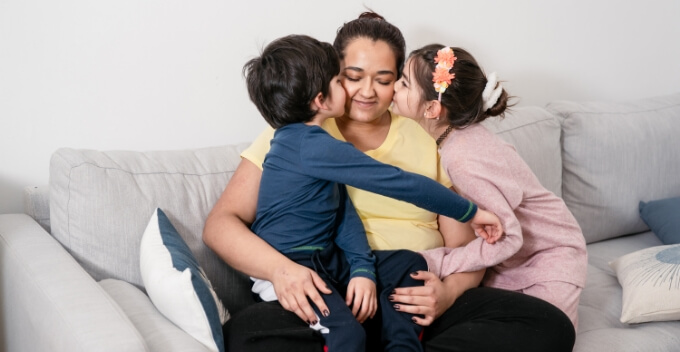Report calls for simplified access to francophone health services
27 April 2022
A new system capacity report from the Francophone working group of the Kids Come First Health Team assesses access to French-language health services in the Champlain region and finds a resounding need to improve, facilitate and centralize access to care, with a priority focus on service for mental health and addictions, and medically complex care.
Led by the Francophone working group of Kids Come First, Portrait of health service needs for francophone children and youth and their families is the result of public consultation and the evaluation of existing French-language health services offered by 40 local organizations.
Some of the system capacity report’s recommendations highlight:
- kids with mental illness, addiction or medical complexity need faster access to services in French;
- the system’s need for better planning to improve access to French-language services, based on where a family lives and the care needed;
- a need to improve French-language support and respite services to help parents and siblings of family members receiving mental health and addiction services, and medically complex care.
The Francophone working group notes that some of the highlighted needs require structural changes within the sector of care and will take time to improve, but some are more easily addressed.
“A simple place to start, and what we’ve heard from families, is that consistently making an upfront offer of French-language provision of care would go a long way. Families are often not aware that an organization has Francophone care providers,” said Hélène Fournier, Executive Director at Valoris for Children and Adults of Prescott-Russell.
Portrait of health service needs for francophone children and youth and their families, published by OZi, is a complement to the THRIVE Report from 2017, Canada’s first pediatric system capacity report that was done for the Champlain health region and served as a foundation for the Kids Come First Health Team application, which was approved by the Ontario Ministry of Health in 2019.
Portrait of health service needs for francophone children and youth and their families is also accompanied by a new interactive platform that allows families and professionals to easily find Francophone health services that are closest to them in the Champlain region. It fulfills the needs expressed by Francophone children and youth, and their parents, to quickly find health services that are available in French. This first version of the mapping platform also serves as a base for planning future services. It takes the data collected, such as the number of French-language services related to the Francophone population in a given area, and shines a light on where gaps exist.
The Kids Come First Health Team is already implementing strategies to support young Francophones in the region, including 1Call1Click.ca, a one-stop service developed to help children, youth and their families of the Champlain region connect with the right mental health services, when they need it.
This initiative results from a strong collaboration between mental health service providers in the Champlain region to ensure that Francophones have access to a continuum of French-language services that meet their needs and take their reality into account.
In addition, last September the Kids Come First Health Team began providing pediatric home and community care. We are currently working with families and community service partners to transform this care, and one of the priorities is to improve the experience of care for families of Francophone children and youth with medically complex care needs.
Quotes from people interviewed
“As Francophones, we tend to speak in English if we are bilingual to make things easier. If we insisted more, it could make a difference. When they see that we speak in English, they take it as an excuse to offer services in English only. We underestimate the number of people who speak French, even if they are not super comfortable. We were sent someone who speaks French at home, but she was really struggling. We insisted that she speak French to our child, even though it wasn’t perfect. Sometimes we don’t insist enough.”
“The forms are often in English. I always have to translate for Mom who doesn’t speak English.”
-30-
Media Contacts
Hanane Abdelmadjid
Communications and Liaison Manager, Centre Le Cap
613.789.2240, ext. 206
habdelmadjid@centrelecap.ca
Nadya-Lee Ringuette
Communications Supervisor, Valoris for Children and Adults of Prescott-Russell
613.673.5148, ext. 2303
nringuette@valorispr.ca
















